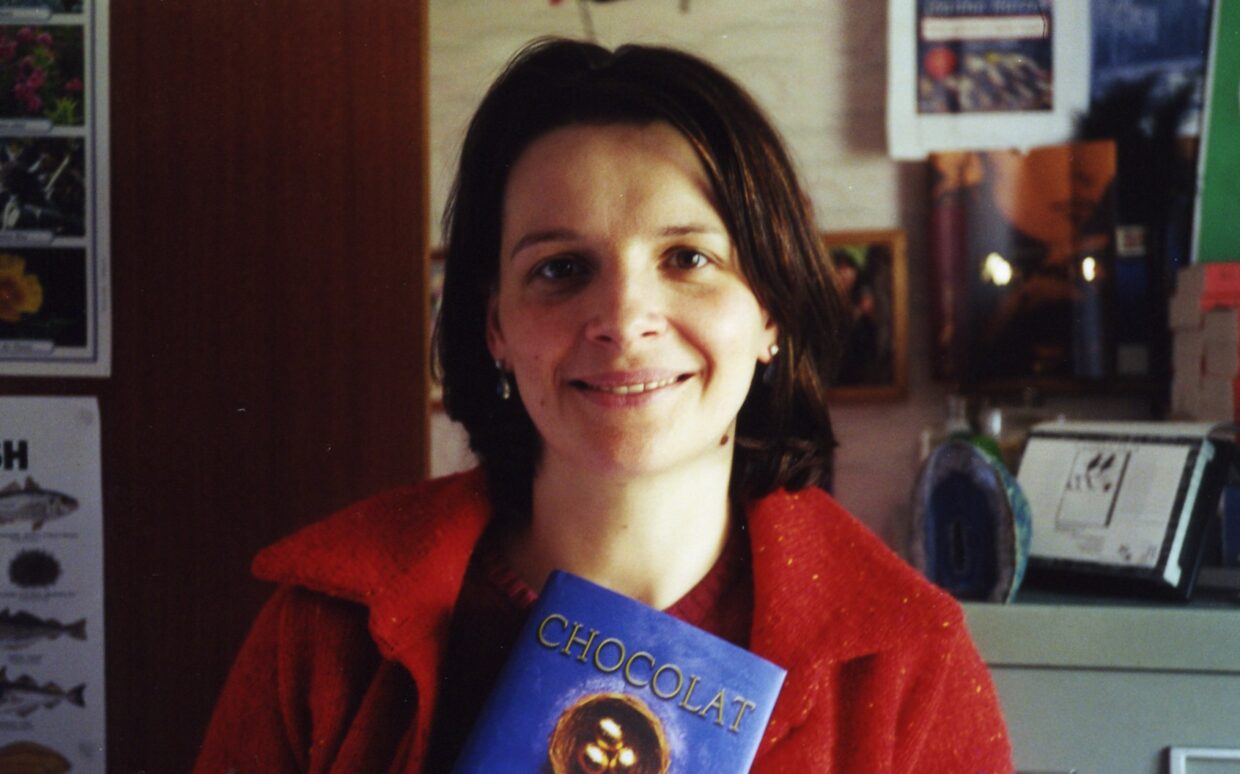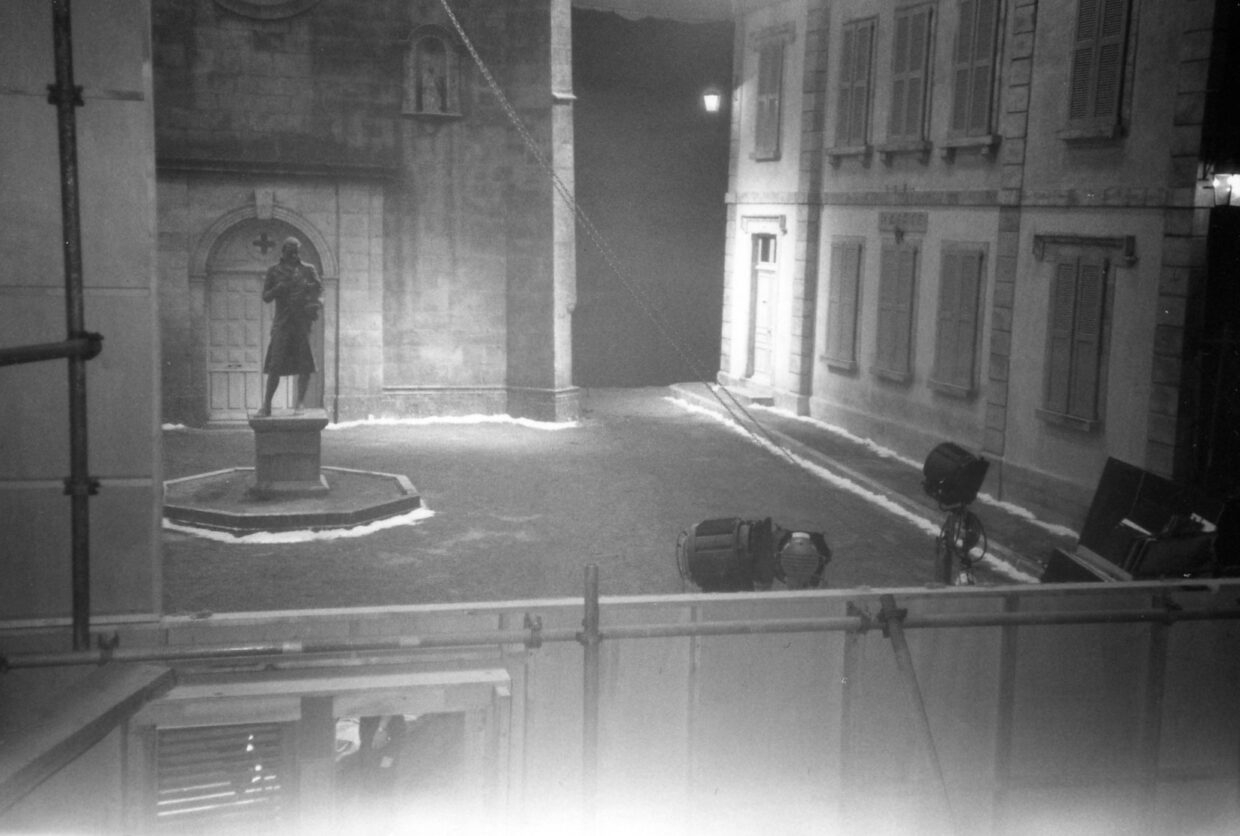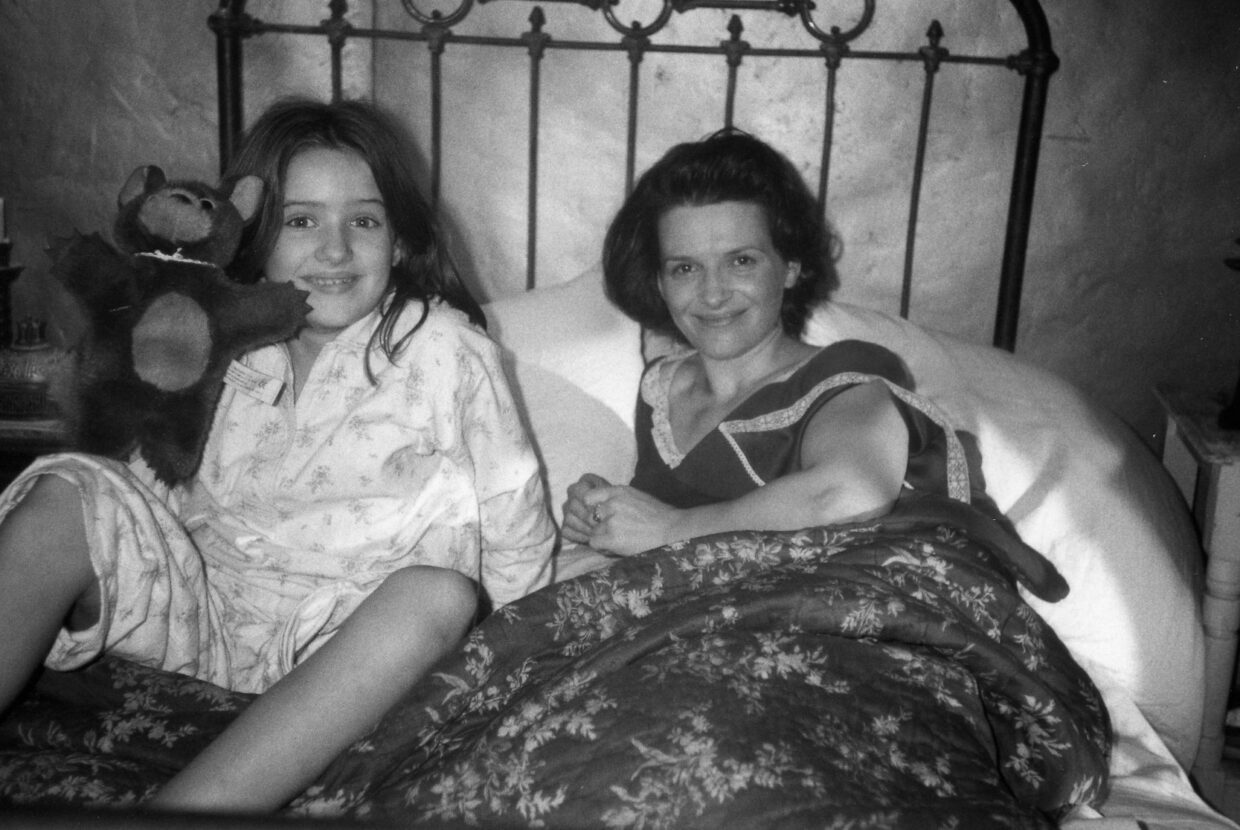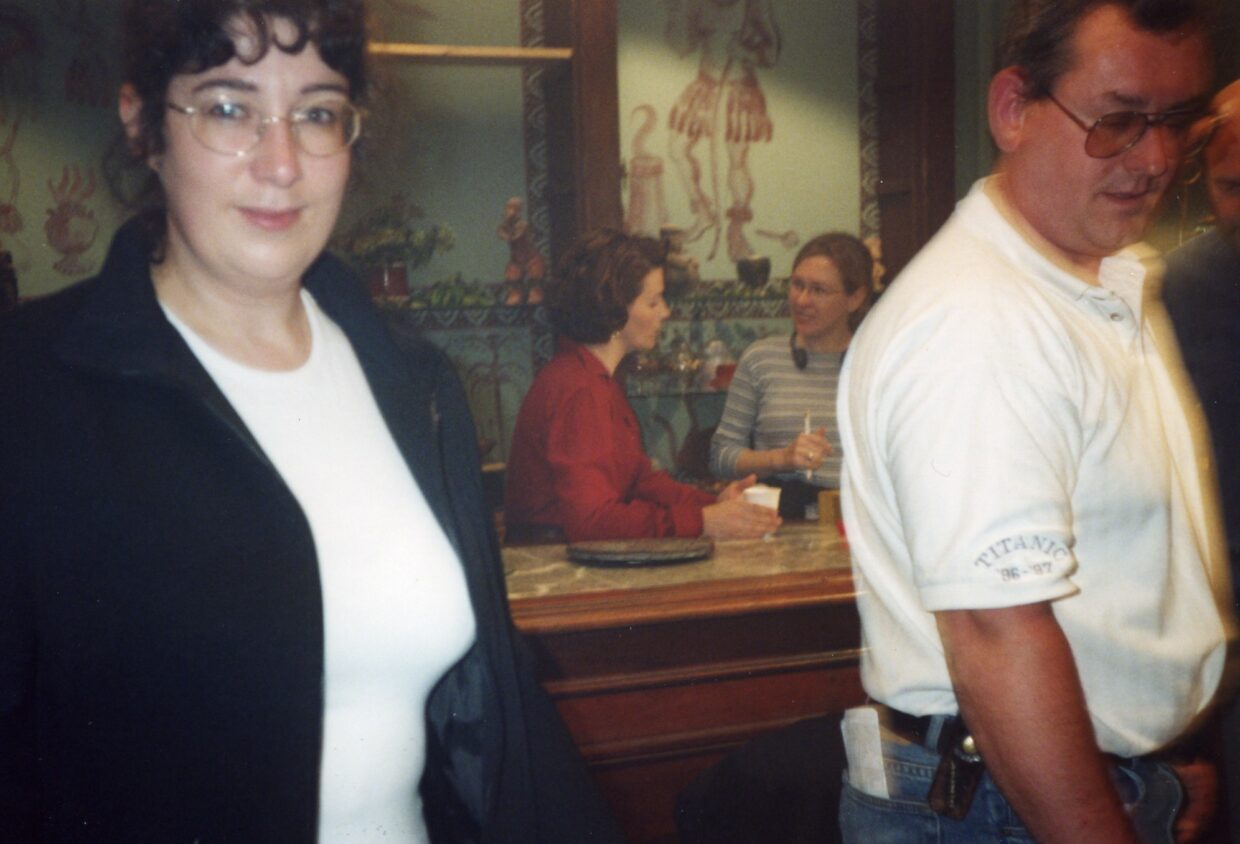 Juliette Binoche, at my home, holding her copy of Chocolat. (All photos via Joanne Harris.)
Juliette Binoche, at my home, holding her copy of Chocolat. (All photos via Joanne Harris.)
It’s May, 2000, and the village square is covered in a dusting of snow. Three old ladies dressed in black peer through a tiny shop window, and a group of children in thick winter coats play with a Jack Russell dog. It might almost be real: except for the heat, and the strong scent of chocolate, the illusion is almost perfect. It should be—the little French village square has been recreated with painstaking care, stone by stone, on a sound stage at Shepperton Studios, England. I recognize it instantly, although I have never been there. I recognize the shop, too. I recognize the people, even though we have never met. I even recognize the dog. They are all from my novel, Chocolat, and this is the set of the movie.
 The village square, at Shepperton Studios.
The village square, at Shepperton Studios.
Over a quarter of a century later, I can still look back on that scene with a sense of unreality. It only exists on film now, but it’s one of the moments that shaped my life; that put me on a road that has taken me all over the world.
When Chocolat first came out, I was the mother of a four-year-old, teaching French in an English grammar school. I had few illusions regarding my career as a writer: Chocolat was my third book; the other two had sunk without trace. The surprise success of a novel I’d been told was “uncommercial” took me by surprise most of all. But something in Chocolat—the tale of a single mother, Vianne, who opens a chocolate shop in front of the church, on the first day of Lent, in a tiny, conservative French village, setting the villagers at loggerheads—had captured the public imagination. It was first published in Italy in autumn 1998, then in the UK, then the US and a dozen other countries.
When, 18 months later, the film came out, to a flurry of Oscar and BAFTA nominations, I was still in denial. Everything had happened so fast: the unexpected success of the book; the acquisition of the rights; the visit from Juliette Binoche, who had been cast in the role of Vianne; the time spent on set at Shepperton (where I took my photographs); my night at the Oscars; all of it seemed like fiction. It would take me another ten years (and several more bestsellers) to accept that this was reality: that I had left my teaching job to become a full-time author; that my books were popular all over the world, published in 50 countries. All this on account of a funny little book I’d been assured could never succeed.
 Juliette Binoche and Victoire Thivisol, relaxing between takes on set.
Juliette Binoche and Victoire Thivisol, relaxing between takes on set.
The writing industry is full of advice preparing authors for failure. There’s very little advice on how to prepare for success; still less about how to handle the worldwide success of a movie and the expectations that must inevitably follow. I found my way nevertheless: I tried not to let the success of the film dictate my career’s trajectory; I wrote several books in different genres before allowing myself to write a sequel to Chocolat, as if to prove to myself that I didn’t need Vianne Rocher to succeed in the writing business.
And I am not Vianne—in fact, she and I could hardly be any different. She is a free spirit, unable to settle for long in any given place. I am never happier than when I am at home in Yorkshire. She spends hours preparing delicious meals: my cooking is experimental at best, and occasionally catastrophic. She is extravagantly sociable: I am a typical introvert. But Vianne and I have always had an unexpected connection. Unlike in so many ways, we share one important thing: motherhood. Chocolat was the story of a woman with a very young child: its sequel, The Lollipop Shoes, showed her as the mother of a young adolescent, and Peaches for Father Francis, as the mother of a young adult.
The last novel, The Strawberry Thief, deals with the theme of a child leaving home, and the unexpected grief it can bring. Four stages of motherhood, depicted over twenty-six years, and following my own path as my child grew into adulthood. Without this connection, I might not have tried to follow Vianne any further: but motherhood linked us most of all, and motherhood keeps us connected, in spite of the differences between us.
Which is why, twenty-six years after the publication of Chocolat, I have come back to Vianne’s world, not with a sequel, but with an origin story. Vianne and I have both reached a stage at which we need to look back before moving forward. Hence, Vianne: set six years before the events of Chocolat, it begins with Vianne arriving in the French coastal city of Marseille from New York, following the death of her mother. She is twenty-one, pregnant, homeless, traveling under an assumed name, and, for the first time in her life, alone. She desperately wants to do the right thing for the child she is carrying, but has no idea how to be a mother. She has never cooked a meal, knows nothing about chocolate—and yet, she has an empathy that leads her to understand the people around her, to see their damage and sense what they need.
This is Vianne before she becomes Vianne; which is why I have returned to Chocolat, and the film set, for my inspiration. I need to find Vianne’s voice; not the voice of the woman with whom I have spent the greater part of my adult life, but the girl she was before it all; that well-meaning, sometimes abrasive girl, uncertain of the future. The Vianne of this book has no idea of how things are going to turn out: of the journey she will take with her child; of the many adventures they have in store. She has no idea that the choices she makes will take her all around the world and into the hearts of many. In fact, for the first time in twenty-six years, Vianne has a lot in common with me. Or at least, as I was in those early days: a teacher, with a young child, plunged into a different world; unsure of which path to take, and paralysed by choices.
I want to tell her: it will be fine. Everything’s going to be okay. And maybe this book is my way of doing that; of telling my naïve younger self that sometimes things do turn out right; that magic really happens. Looking back at the person I was, I understand that I am much closer to Vianne than I first thought when I wrote Chocolat: I just didn’t recognize myself in the woman I was to become. Or maybe Vianne has somehow changed me, as friends grow alike with the passage of time. In any case, it’s going to be fine, I tell the girl in the story. We’re going to see amazing things; travel to faraway places. We’re going to laugh a lot on the way, learn a lot, grieve a little—but in the end, we’re both in this together.
 On set, in the chocolaterie, with Juliette in the background.
On set, in the chocolaterie, with Juliette in the background.
___________________________________________
Vianne by Joanne Harris is available via Pegasus.

